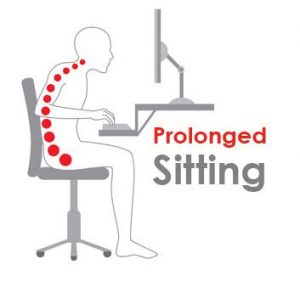- Home
- Editorial
- News
- Practice Guidelines
- Anesthesiology Guidelines
- Cancer Guidelines
- Cardiac Sciences Guidelines
- Critical Care Guidelines
- Dentistry Guidelines
- Dermatology Guidelines
- Diabetes and Endo Guidelines
- Diagnostics Guidelines
- ENT Guidelines
- Featured Practice Guidelines
- Gastroenterology Guidelines
- Geriatrics Guidelines
- Medicine Guidelines
- Nephrology Guidelines
- Neurosciences Guidelines
- Obs and Gynae Guidelines
- Ophthalmology Guidelines
- Orthopaedics Guidelines
- Paediatrics Guidelines
- Psychiatry Guidelines
- Pulmonology Guidelines
- Radiology Guidelines
- Surgery Guidelines
- Urology Guidelines
Prolonged Sitting may lead to poor memory

A sedentary lifestyle is a lifestyle characterized by the absence of any physical activity. and its negative effects include obesity, backache, poor memory and mood swings.Prabha Siddarth, a biostatistician at the Semel Institute for Neuroscience and Human Behavior at UCLA, and colleagues conducted a study to evaluate the impact of sedentary lifestyle on brain health. The researchers found that that sitting for a long time negatively impacts MTL region of the brain which is responsible for memory. The study was published in the journal PLOS ONE.
Studies show that too much sitting, like smoking, increases the risk of heart disease, diabetes, and premature death. Researchers at UCLA wanted to see how sedentary behavior influences brain health, especially regions of the brain that are critical to memory formation.
UCLA researchers recruited 35 people ages 45 to 75 and asked about their physical activity levels and the average number of hours per day they spent sitting over the previous week. Each person had a high-resolution MRI scan, which provides a detailed look at the medial temporal lobe, or MTL, a brain region involved in the formation of new memories.
The researchers found that sedentary behavior is a significant predictor of thinning of the MTL and that physical activity, even at high levels, is insufficient to offset the harmful effects of sitting for extended periods.
This study does not prove that too much-sitting causes thinner brain structures, but instead that more hours spent sitting are associated with thinner regions, researchers said. In addition, the researchers focused on the hours spent sitting, but did not ask participants if they took breaks during this time.
The researchers next hope to follow a group of people for a longer duration to determine if sitting causes the thinning and what role gender, race, and weight might play in brain health related to sitting.
The study was supported by grants from various funders including the National Institutes of Health, the U.S. Department of Energy and the McLoughlin Gift Fund for Cognitive Health.

Disclaimer: This site is primarily intended for healthcare professionals. Any content/information on this website does not replace the advice of medical and/or health professionals and should not be construed as medical/diagnostic advice/endorsement or prescription. Use of this site is subject to our terms of use, privacy policy, advertisement policy. © 2020 Minerva Medical Treatment Pvt Ltd